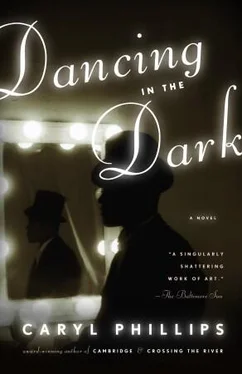The knock on the door startles him. He waits patiently for another knock, or voice, but there is nothing. Eventually, he rises from his chair and moves toward the door, which he opens on Mr. Ziegfeld, who stands by himself. “I’m sorry, Bert,” he begins, “but perhaps you might care to join us in the Circle Bar as we’d like to raise a glass to you.” Mr. Ziegfeld does not say who the “we” are that he is referring to, but Bert imagines that Mr. Ziegfeld means his business friends and colleagues, and so he slowly nods (“Thank you”) and after his boss has turned smartly on his heels he closes in the door. There is a debt of gratitude to be paid to this man who fought against convention, and many of his established stars, in order that he might include Bert in the Follies of 1910 as the first colored man to appear onstage with the most important performers in the country. Those who had any objection to appearing with a colored man were invited by Mr. Ziegfeld to join another company, but all the members of the Follies company promptly discovered that they did not, after all, have any difficulty playing alongside a colored man, and so Bert found himself onstage and staring out at Mr. Ziegfeld’s audience, sometimes singing, sometimes dancing, sometimes telling an anecdote, but always the only tanned player among the Irish, and the Australians, and the Jews, and the Germans, and the Italians, who were the constituent parts in Ziegfeld’s new and conspicuously lavish entertainment. In 1910 his nigger face shocked Ziegfeld’s patrons with its elastic elegance, while his colored body made them laugh with its alarming, but perfectly choreographed, eccentric grace. And now the Follies of 1919 has reached its conclusion, and Mr. Ziegfeld has asked to see him. He takes the soiled towel and once again rubs it anxiously against his face, and he reminds himself that not all journeys leave footprints that are visible to others. He cannot expect the man who has summoned him to the Circle Bar to know from where he has come or to where he is going. His journey, with all its difficulties, is nobody’s business but his own. The continual sucking of his shoes into a muddy path, and the supreme effort that it has taken to consistently dislodge his feet and keep moving on his way, makes him admirable to nobody. After nine years Mr. Ziegfeld and his fellow players see nothing, only the image of a somewhat reticent and grateful man that they wish to see. He puts down the towel and stares unhappily into the mirror, conscious that too much life has flown from this one body in too short a space of time. A pulse still beats within him, that much he is sure of, but the rhythm is weaker now. Death’s wings are brushing close by and their touch occasionally startles him, and of late the heaviness of his body has begun to convince him that he may have already entered the final season of his life. He stands and proceeds to change into his street clothes. As he does so his eyes scan the desolate and uncluttered dressing room and they eventually alight upon the solitary whiskey bottle and tumbler.
Up in the Circle Bar the whole cast and crew are gathered around Mr. Ziegfeld, and as Bert enters the room they applaud enthusiastically. He smiles and takes the glass of champagne that is presented to him on a silver tray, and he listens now as Mr. Ziegfeld lists the colored man’s achievements and then offers a generous toast, gently tipping his glass in Bert’s direction as he reaches his conclusion. There are cheers and all eyes are upon him, for Bert is not only a member of the cast, he is their unacknowledged leader and a beaming Ziegfeld has, from the beginning, suspected that this would be the case. But Mr. Ziegfeld, with his raised glass, still knows nothing of the nature of this colored man’s journey. Mr. Ziegfeld does not understand the place that Bert Williams has arrived at today.
I liked the man as well as any man I ever met and better than most men, for he had so many fine qualities. I admired him as an artist tremendously because he was a great artist. In fact, he was so great that it was impossible for him to do anything badly. He played down-and-out boarders, porters, cabdrivers, crap shooters, poker players. Any role that called for the downtrodden was Williams’s meat. He was a consummate artist in a sea of banality; technically perfect, timing immaculate, his portrayal of his people the only flaw on his otherwise perfect diamond.
FLORENZ ZIEGFELD
And then Miss Fanny Brice edges her way around to greet him personally, as he knew she would, with an already empty champagne glass in her hand and a broad smile on her face, and her eyebrows plucked neatly into the familiar dark arches. To begin with she was one of those who would have preferred that Mr. Ziegfeld not employ a colored man, even if that colored man happened to be Mr. Bert Williams, but she quickly grew to admire his manners and his modesty, and she came to understand that of all the techniques on display on Ziegfeld’s stage, his was the one from which she might learn. So, Mr. Williams, you ready to tell me what’s next for you, or you planning on keeping a poor girl guessing? She touches glasses with him and then threads her arm through his and leans softly against the stiff formality of his body. Well, well, well, Mr. Williams, has your silvery tongue left that noble head of yours? Here, in the private space of the theater, he finds it possible to tolerate Fanny’s behavior, but he knows that beyond the Circle Bar this degree of intimacy is not befitting. But she too understands this, and despite her bluster and bravado, and her origins in burlesque, this is a woman who knows the meaning of the word “decorum.” But he cannot tell her what next, for as yet he has no plans, except to sit out the rest of 1919. He says nothing to Miss Fanny Brice and he simply casts her that warm smile of his that he knows makes most folks feel easy around him.
His carefully constructed smile never fooled Eva, who knew full well that he did not approve of her antics either on or offstage. This being the case, it surprised him that a few months after George’s passing, Eva should approach him in the wings of the theater as he was leaving the stage of the Follies of 1911. He was embarrassed that he was still in his makeup, but he could see in Eva’s eyes that she was desperate to talk and her unkempt hair, and sunken cheeks, and bare legs suggested that all was not well with George’s friend. It was already something of a humiliation for her to sneak into the theater in this manner, for people knew full well who she was, but he nevertheless had no choice but to ask her to wait in the crowded corridor outside his dressing room until he had removed his face. Her eyes began to dart like mice, and he could see that she was disconcerted by his request, but this was too private a process for him to undertake with an audience and he assured her that he would be lively. Eventually he opened the door, begrimed towel in hand, and Eva passed into his dressing room, but he chose not to fully close in the door behind her. For a few moments they sat and faced each other in silence, and then he broke the tension and told her that as far as he was able to ascertain, George had passed on peacefully. He told her that while life had not been easy for George at the end, Aida had made him as comfortable as possible. He noticed Eva flinch at the mention of Aida’s name, and he watched as George’s friend lowered her eyes. For a few moments she appeared to be deep in thought, and then she looked up and the words came tumbling out. There was a child, nearly three years ago, but I didn’t tell George, I just found out where to get myself fixed and I got rid of it as I didn’t see how it was going to help anybody. Eva now had Bert’s full attention, but once again she paused and lowered her eyes as though encouraging him to ask a question, or make a statement, but he could think of nothing that he might immediately say and so he remained silent. They sat together for what seemed like an age until Eva abruptly climbed to her feet and forced a smile. I just thought that you should know. He watched as a dejected Eva turned and, with a barely perceptible movement of her hips, left his dressing room and closed in the door behind her.
Читать дальше












